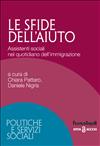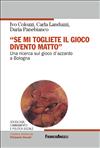
Assistenti sociali nel quotidiano dell'immigrazione
I risultati di una ricerca empirica focalizzata sul rapporto tra assistenti sociali e utenti immigrati, sul loro rapporto quotidiano con l’utenza immigrata, sulle dinamiche relazionali, sugli strumenti operativi, sulle fatiche legate al ruolo professionale, sul bisogno di formazione e sulle sfide cui il servizio sociale è chiamato a rispondere.
cod. 11130.3

